高中英语作文:如何提高学习效率
如何提高学习效率英语范文
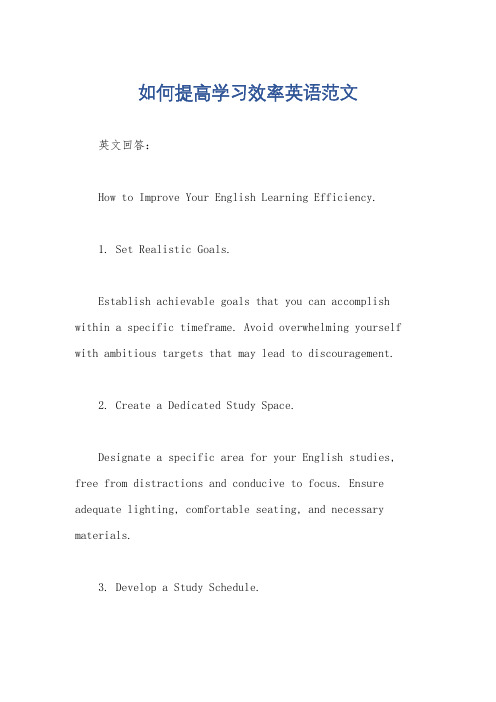
如何提高学习效率英语范文英文回答:How to Improve Your English Learning Efficiency.1. Set Realistic Goals.Establish achievable goals that you can accomplish within a specific timeframe. Avoid overwhelming yourself with ambitious targets that may lead to discouragement.2. Create a Dedicated Study Space.Designate a specific area for your English studies, free from distractions and conducive to focus. Ensure adequate lighting, comfortable seating, and necessary materials.3. Develop a Study Schedule.Establish a consistent study routine that aligns with your availability and learning style. Allocate specific time slots for various aspects of language acquisition, such as vocabulary, grammar, and listening comprehension.4. Use Variety of Learning Materials.Engage with different resources to enhance your learning experience. Utilize textbooks, online courses, immersion materials (movies, podcasts, music), and interactive apps.5. Practice Regularly.Regular practice is crucial for developing fluency and retention. Dedicate time each day to reading, writing, listening, and speaking English. Consider finding a language partner or joining a study group.6. Focus on Active Recall.Instead of passively rereading notes, engage in activerecall by quizzing yourself on vocabulary, grammar rules, and sentence structures. This helps improve memory and retention.7. Immerse Yourself in English.Surround yourself with English as much as possible. Watch English movies and TV shows, listen to English music and podcasts, and read English books and articles. This helps improve your comprehension and familiarizes you with idiomatic expressions.8. Seek Feedback and Support.Obtain feedback from teachers, language partners, or native speakers to identify areas for improvement. Join online forums or support groups to connect with other learners and share resources.9. Stay Motivated.Maintain enthusiasm by setting small, attainable goalsand rewarding yourself for progress. Celebrate your achievements and don't get discouraged by setbacks. Remember that language learning is a journey, not a destination.10. Be Patient and Persistent.Fluency takes time and consistent effort. Avoid rushing the process and embrace the learning journey. Celebrate your progress, learn from your mistakes, and staypersistent in your studies.中文回答:如何提高你的英语学习效率。
如何提高学习效作用英语作文

如何提高学习效作用英语作文Enhancing Learning Efficiency: A Comprehensive Guide.In the fast-paced world of today, the importance of learning efficiently cannot be overstated. Whether you're a student aiming for academic excellence or a professional seeking to stay ahead in your field, maximizing your learning potential is crucial. This article delves into practical strategies and techniques that can help you improve your learning efficiency.1. Set Clear Learning Goals.Before embarking on any learning journey, it'sessential to have a clear understanding of what you want to achieve. Specific and measurable goals give you a sense of direction and help you stay focused. For example, if you're learning a new language, your goal could be to achieve fluency in conversation within a set timeframe.2. Create a Structured Learning Plan.A well-structured learning plan ensures that you cover all the necessary topics and concepts in a systematic manner. Divide your learning into manageable chunks and allocate specific time slots for each topic. This approach helps you stay organized and prevents you from getting overwhelmed.3. Leverage Technology.In the digital age, there's an abundance of resources and tools available to enhance learning. Utilize online courses, interactive software, and mobile applications to make learning more engaging and effective. Technology can also help you personalize your learning experience, catering to your unique needs and preferences.4. Active Learning Techniques.Passive learning, such as reading textbooks orlistening to lectures, is not always the most effective wayto learn. Active learning techniques, such as discussing ideas with others, solving problems, and creating summaries or mind maps, help consolidate knowledge and加深理解。
如何提高学习效率英语作文演讲稿
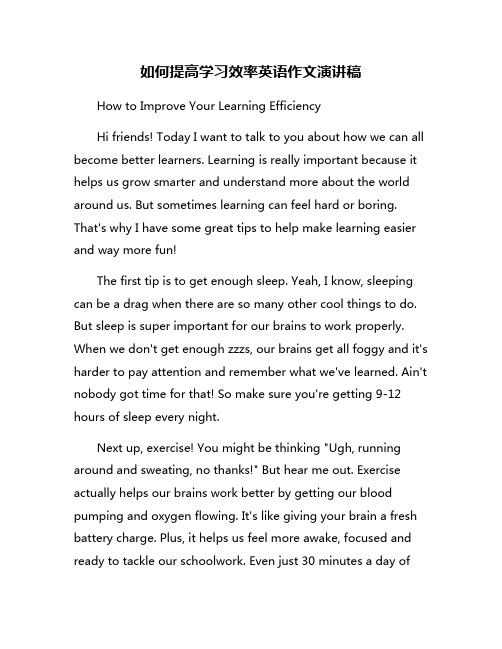
如何提高学习效率英语作文演讲稿How to Improve Your Learning EfficiencyHi friends! Today I want to talk to you about how we can all become better learners. Learning is really important because it helps us grow smarter and understand more about the world around us. But sometimes learning can feel hard or boring. That's why I have some great tips to help make learning easier and way more fun!The first tip is to get enough sleep. Yeah, I know, sleeping can be a drag when there are so many other cool things to do. But sleep is super important for our brains to work properly. When we don't get enough zzzs, our brains get all foggy and it's harder to pay attention and remember what we've learned. Ain't nobody got time for that! So make sure you're getting 9-12 hours of sleep every night.Next up, exercise! You might be thinking "Ugh, running around and sweating, no thanks!" But hear me out. Exercise actually helps our brains work better by getting our blood pumping and oxygen flowing. It's like giving your brain a fresh battery charge. Plus, it helps us feel more awake, focused and ready to tackle our schoolwork. Even just 30 minutes a day ofwalking, riding your bike or playing outside can make a big difference.Okay, so we've got enough sleep and exercise down. Now let's talk about how to actually study more efficiently. One of the best ways is to find a distraction-free study space. That means no TV, video games, music or little siblings bugging you. Having a special study zone helps train your brain to switch into learning mode. It can be a quiet corner of your room, the kitchen table, or even a special study carrel at the library. Wherever you choose, keep it clean and free of clutter so you can concentrate.While you're studying, it's also really helpful to take short breaks every 30-45 minutes. That might seem counterproductive, but it actually lets your brain recharge so you can refocus better after the break. Go stretch, grab a healthy snack, or do a couple minutes of exercise to get your blood pumping again. Then you can dive back into your work feeling refreshed.Speaking of snacks, staying fueled with healthy foods and drinks is key for peak brain power. Junk food might seem tempting, but it can actually make you feel sluggish after the initial sugar rush wears off. Go for brain-boosting foods like fruits, veggies, nuts, yogurt and whole grains instead. And drinkplenty of water – dehydration is a leading cause of tired, unfocused brains.Now that we've got the basics covered, here are some ninja study hacks to take your learning to the next level. One awesome technique is called "active recall." Basically, instead of justre-reading your notes over and over, put them aside and try to recall as much as you can from memory first. It's kind of like an open-book test...but without the book! Quizzing yourself like this makes the information stick way better.You can also visualize concepts using mind maps, diagrams and sketches. Draw a big circle for the main idea, then branch out with different shapes and visuals for supporting details. Making these types of visual notes engages more of your brain than just words and helps you see how different concepts connect together.Another cool strategy is something called "interleaving." That's just a fancy way of saying to mix up your practice rather than doing the same thing over and over. So instead of doing 50 math problems all in a row, split them up and switch between different types of problems or subjects. It sounds weird, but this approach actually leads to better long-term retention.Last but not least, don't be afraid to ask for help if you're feeling stuck! That's what teachers, parents, tutors and even classmates are there for. Trying to push through on your own when you're really struggling can just lead to frustration. Swallow your pride and get that extra boost – you'll learn so much more in the end.Phew, that was a lot of tips! To recap, here are the key things to focus on for optimum learning:Get enough sleepExercise regularlyFind a distraction-free study spaceTake breaks to rechargeFuel up with healthy foods and drinksUse active recall and visualsInterleave your practiceAsk for help when neededFollow this gameplan and you'll be a learning machine in no time! It might take some adjustment at first, but I promise these strategies will help make your studies feel way easier and moreeffective. Just don't forget to still make time for fun and hanging out with friends too – that's important for your brain as well. Learning is a journey, so enjoy the ride! Thanks for listening, and happy learning!。
提高学习效率的英语作文(通用5篇)

提高学习效率的英语作文提高学习效率的英语作文(通用5篇)学习效率是学习快慢的表示形式。
提高孩子的学习效率是每个老师的心愿,更是学生及其家长的追求目标。
下面是小编帮大家整理的提高学习效率的英语作文,仅供参考,希望能够帮助到大家。
提高学习效率的英语作文篇1As students, we have to study almost every day. However, not everybody knows how to study efficiently.Do you want to know better about it?There is some relationships between the study efficiency and the hours spent in studying in a day.In fact, more hours of study do not necessarily result in better or higher study efficiency.It is said that the optimum of efficiency comes when one studies about 5 hours and the efficiency begins to drop as he studies longer than it. By the time when one studies 11 hours per day,his efficiency of study becomes very poor.In conclusion, there is always a maximum of efficiency and an appropriate amount of time for study in a day. More time spent in study doesn’t always mean greater efficiency.作为学生,我们几乎每天都要学习。
如何提高学习效率英语范文
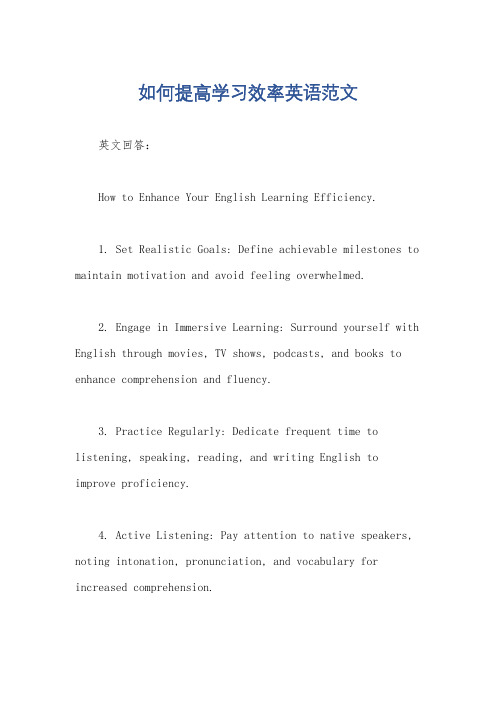
如何提高学习效率英语范文英文回答:How to Enhance Your English Learning Efficiency.1. Set Realistic Goals: Define achievable milestones to maintain motivation and avoid feeling overwhelmed.2. Engage in Immersive Learning: Surround yourself with English through movies, TV shows, podcasts, and books to enhance comprehension and fluency.3. Practice Regularly: Dedicate frequent time to listening, speaking, reading, and writing English to improve proficiency.4. Active Listening: Pay attention to native speakers, noting intonation, pronunciation, and vocabulary for increased comprehension.5. Repetition and Spaced Retrieval: Regularly review learned material to strengthen memory and improve recall.6. Utilize Technology: Leverage language learning apps, online dictionaries, and virtual assistants for support and convenience.7. Find a Study Buddy: Collaborate with a friend ortutor to practice conversation, exchange feedback, and stay motivated.8. Visual Aids and Mnemonics: Use flashcards, mind maps, and memory techniques to enhance memorization and comprehension.9. Immersive Travel: Immerse yourself in an English-speaking environment to gain authentic language exposureand accelerate learning.10. Consistency and Discipline: Establish a regular study schedule and stick to it to maintain progress and maximize efficiency.中文回答:如何提高你的英语学习效率。
英语作文-如何提高学习效率

英语作文-如何提高学习效率In today's fast-paced world, improving study efficiency is crucial for academic success and personal growth. Whether you're a student aiming for better grades or a lifelong learner seeking mastery in a subject, enhancing your learning effectiveness can significantly impact your outcomes. Here are some effective strategies to boost your study efficiency:First and foremost, establish clear goals. Define what you want to achieve in your studies and break down these goals into manageable tasks. Having a clear sense of direction will keep you focused and motivated throughout your learning journey.Secondly, develop a personalized study plan. Tailor your study schedule to fit your learning style, preferences, and commitments. Allocate specific time slots for studying each subject or topic, and be consistent in following your plan. This structured approach will help you make the most of your available time and avoid procrastination.Moreover, prioritize tasks based on their importance and urgency. Identify the most critical concepts or skills that require your immediate attention and tackle them first. By prioritizing effectively, you can maximize your productivity and ensure that you're making progress towards your goals.Additionally, create a conducive study environment. Find a quiet and comfortable space where you can concentrate without distractions. Keep your study area organized and free from clutter to promote focus and clarity of mind. Eliminating distractions such as electronic devices or noisy surroundings will enable you to immerse yourself fully in your studies.Furthermore, adopt active learning techniques. Instead of passively absorbing information, engage with the material actively through methods such as summarizing, questioning, and teaching others. Actively participating in your learning process enhances comprehension, retention, and critical thinking skills.Another effective strategy is to utilize technology wisely. Leverage digital tools and resources to streamline your studying process, such as educational apps, online tutorials, or digital flashcards. However, be mindful of not letting technology become a distraction and use it purposefully to enhance your learning experience.Moreover, practice regular review and reinforcement. Periodically revisit previously learned material to reinforce your understanding and commit it to long-term memory. Use techniques like spaced repetition or self-testing to enhance retention and recall over time.Furthermore, take care of your physical and mental well-being. Maintain a balanced lifestyle with adequate sleep, healthy nutrition, and regular exercise. Manage stress effectively through relaxation techniques such as deep breathing, mindfulness, or hobbies that bring you joy. A healthy mind and body are essential for optimal cognitive function and learning performance.In conclusion, improving study efficiency requires a combination of strategic planning, active engagement, and self-care. By setting clear goals, organizing your study routine, prioritizing tasks, creating a conducive environment, employing active learning techniques, leveraging technology, reviewing regularly, and taking care of your well-being, you can maximize your learning outcomes and achieve success in your academic pursuits. Remember, continuous improvement is key, so stay committed to refining your study habits and adapting them to your evolving needs and goals.。
英语提高学习效率的范文优选12篇

英语提高学习效率的范文优选12篇英语提高学习效率的范文第一篇I like English. I think I can share my English learning method with you.First of all, develop interest on English. My way to make it is to watch movies from abroad. At first, I will watch the movie with subtitle. Then I will remove the subtitle, only English left. Gradually, show great interest in English. Secondly, recite vocabularies. Vocabulary is the necessary foundation to start learn English. This time you have to force yourself to remember words. Thirdly, understand basic grammar thoroughly. It is hard for me to understand the meaning of a sentence if I don’t know th e basic grammar. Last but not least is to speak more. The basic purpose to learn a language is to communicate.So talk in English as much as you can. And don’t worry about losing face, because everyone makes mistakes. Those are my methods.英语提高学习效率的范文第二篇English is one of the most important langnages in the worldHow do you study? Everyone learns English in different ways They are/include listening reading and writing we should remember more words and grammarListening English tapes and repeating after the speakerThird you ask the teachers when you don’t understand any knowledge Youwill find studying Egnlish is interesting and helpful Thanks!英语提高学习效率的范文第三篇Earning English just like learning any other language, is hard work so we should spend time practicing using English. Besides, we should listen to the teacher carefully,review what is learned regularly, prepare each lesson carefully before class, do ourhomework carefully, copy good sentences and recite them and attend English debbates and speech contests. What's more, be patient and confident.Don't be shy and don't be afraid of making mistakes. We must understand that mistakes are unavoidable. So be patient with your mistakes and try to awoid them other time. I believe practice makes perfect. If we study hard, we will learn English well.英语提高学习效率的范文第四篇As we all know, learning efficiency is an important part of learning, but on campus you can hear: some students complain that they are always distracted in class, or some students find that even if they spend a lot of time in class, shocking bad results can not be avoided. Some students feel that they lack the willpower to bepatient with problems. Maybe you are suffering from one of them 。
怎样提高学习效率演讲稿英语作文
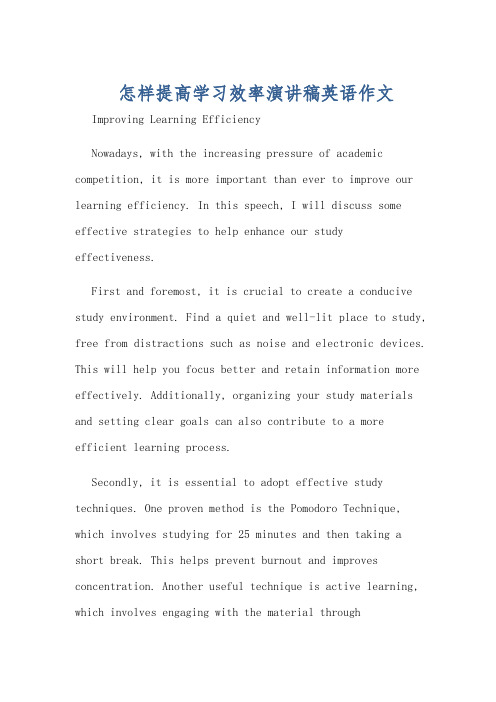
怎样提高学习效率演讲稿英语作文Improving Learning EfficiencyNowadays, with the increasing pressure of academic competition, it is more important than ever to improve our learning efficiency. In this speech, I will discuss some effective strategies to help enhance our study effectiveness.First and foremost, it is crucial to create a conducive study environment. Find a quiet and well-lit place to study, free from distractions such as noise and electronic devices. This will help you focus better and retain information more effectively. Additionally, organizing your study materials and setting clear goals can also contribute to a more efficient learning process.Secondly, it is essential to adopt effective study techniques. One proven method is the Pomodoro Technique, which involves studying for 25 minutes and then taking a short break. This helps prevent burnout and improves concentration. Another useful technique is active learning, which involves engaging with the material throughactivities such as summarizing, questioning, and teaching others.Furthermore, it is important to prioritize tasks and manage your time wisely. Use tools such as to-do lists and calendars to plan your study schedule and allocate time for each subject accordingly. By setting specific goals and deadlines, you can stay motivated and on track with your studies.In addition, it is beneficial to take care of your physical and mental well-being. Make sure to get enough sleep, exercise regularly, and eat a balanced diet. A healthy body and mind are essential for optimal learning performance. Moreover, practicing mindfulness andrelaxation techniques can help reduce stress and improve focus.Lastly, it is important to seek help and support when needed. Don't hesitate to ask questions, consult with teachers or classmates, or seek tutoring if you are struggling with a particular subject. Remember, it is okay to ask for help, and doing so can help you overcome challenges and improve your learning efficiency.In conclusion, by creating a conducive study environment, adopting effective study techniques, managing time wisely, taking care of your well-being, and seeking help when needed, you can significantly enhance your learning efficiency. Remember, the key to success lies in yourability to study smart, not just hard. Thank you.提高学习效率如今,在学术竞争压力日益增大的情况下,提高学习效率比以往任何时候都更加重要。
如何提高学习效率英语作文演讲稿
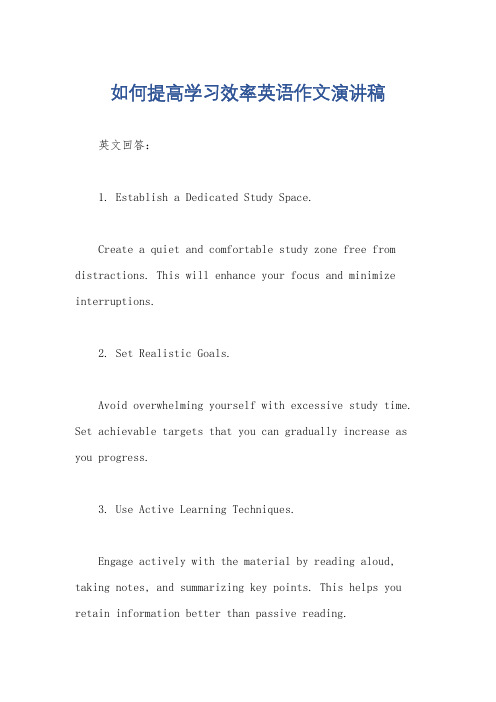
如何提高学习效率英语作文演讲稿英文回答:1. Establish a Dedicated Study Space.Create a quiet and comfortable study zone free from distractions. This will enhance your focus and minimize interruptions.2. Set Realistic Goals.Avoid overwhelming yourself with excessive study time. Set achievable targets that you can gradually increase as you progress.3. Use Active Learning Techniques.Engage actively with the material by reading aloud, taking notes, and summarizing key points. This helps you retain information better than passive reading.4. Break Down Complex Material.Divide large assignments into smaller chunks. Tackle one section at a time to make the task seem less daunting and improve comprehension.5. Take Regular Breaks.Short breaks every hour can help prevent burnout and enhance productivity. Use breaks to move around, stretch, or clear your mind.6. Use Spaced Repetition.Review material at increasing intervals (e.g., 1 day, 3 days, 1 week). This technique strengthens memory and improves long-term retention.7. Leverage Technology.Utilize language learning apps, flashcards, and onlineresources to supplement your learning. These tools can provide interactive exercises and personalized feedback.8. Find a Study Buddy.Partner with a classmate or friend who shares your learning goals. Discuss concepts, quiz each other, and provide support and encouragement.9. Reward Yourself.Set small rewards for completing study milestones. These incentives can boost motivation and make learning more enjoyable.10. Seek Support When Needed.Don't hesitate to ask for help from teachers, tutors, or peers if you encounter difficulties. Seeking clarification and support can significantly improve your understanding.中文回答:1. 建立一个专门的学习空间。
如何提高学习效率英语作文演讲稿

如何提高学习效率英语作文演讲稿全文共3篇示例,供读者参考篇1How to Improve Study EfficiencyHey everyone, I'm sure we can all relate to struggling to stay focused while studying. With so many distractions and responsibilities, it can be really tough to make the most of our study time. But don't worry, I've got some tips that have really helped me boost my productivity and efficiency. Let me share what has worked for me in hopes it can help you too!First off, we have to start with the basics - getting enough sleep. I know, I know, it's tough when you're juggling classes, activities, a job, and maybe even a social life. But running on fumes is only going to hurt you in the long run. When you're sleep deprived, it's harder to concentrate, you get distracted more easily, and you just don't perform at your best. Aim for 7-9 hours per night consistently. It may mean going to bed earlier than you'd like, but your future self will thank you when you're energized and ready to tackle your work.Staying hydrated is another simple but crucial step. Dehydration can cause fatigue, headaches, and difficulty concentrating - the enemies of efficiency. Keep a water bottle with you at all times and make sure to drink regularly throughout the day. I got into the habit of refilling my bottle every time I went to the bathroom so I never ran low.Next up, find your prime studying hours and prioritize them religiously. We all have times of day when we're naturally more focused and productive. For me, it's first thing in the morning. I try to dedicate those precious hours to my toughest tasks. If you're a night owl, save the evenings for the hard stuff. Just don't fight against your personal rhythms - they're there for a reason.Creating the right studying environment is also key. For some, a silent library is perfect. For others, background noise like music helps them concentrate. Personally, I need a clean, uncluttered space with natural light. But you do you - just make sure it's a setting that works for your optimum focus.Be ruthless about distractions. Silence your phone, log out of social media, and close any apps or tabs you don't need. I like to set a timer for distraction breaks - 25 minutes of laser focus, then a 5 minute break to scroll on my phone. That way I don't constantly get pulled away, but I know a break is coming soon tolook forward to. Finding that balance of dedication and scheduled relaxation is important.Taking breaks is so, so important for sustained energy and concentration. I try to get up and move around for 5-10 minutes every hour or so. Getting the blood flowing gives you a little jolt of alertness and clears your mind for when you dive back in. Even just doing a lap around your dorm hallway can help reset and reenergize. And get outside when you can - fresh air does wonders.Eating brain-boosting foods before studying is another great way to set yourself up for success. Things like blueberries, green tea, nuts, seeds, and dark chocolate all contain nutrients that enhance focus and cognition. Stay away from heavy, greasy foods that can make you feel sluggish. I always keep trail mix or a banana on hand for a quick, energizing snack during study sessions.Learning to manage stress is also crucial for peak productivity. Anxiety about deadlines, tests, grades and more can be paralyzing. Take a few minutes before each study period to breathe deeply, visualize success, or do some light stretching to calm your mind. If you ever feel totally overwhelmed, walk away for a bit and do something restorative like exercise orhanging out with friends. Mental health has to be the priority. An overwhelmed brain simply can't concentrate or perform well.We can also maximize our efficiency by understanding our personal learning styles and preferences. Are you a visual, auditory, reading/writing, or kinesthetic learner? Do you retain information better by rewriting your notes, watching videos, reading out loud, or movements like pacing? I'm mainly a visual learner myself, so techniques like mind maps and color coding my notes work great for me. Lean into whatever resonates best for you rather than trying to study in a way that doesn't mesh with your brain. The right approach can make all the difference.Finally, reward yourself! Studying for hours on end is grueling, so be sure to celebrate your hard work. Plan something fun for when you've checked off all your tasks for the day - hang out with friends, watch a show you love, eat a delicious meal. I'm a big believer that anticipating and savoring those rewards actually increases my focus and motivation to power through. We all need a carrot at the end of that stick!That's my crash course on upping your study game! I'm still figuring it out myself, but doing little things like prioritizing sleep, hydration, the right environment, and healthy habits makes such a difference. Know yourself, know your rhythms, and don't beafraid to experiment until you find the perfect mix of strategies that help you perform at your absolute best. We're all in this together, so share tips, keep each other accountable, and don't forget to take care of your whole self - body and mind. Wishing you all the focus, energy and efficiency for an incredibly productive year!篇2Title: Mastering the Art of Efficient StudyingHello fellow students! As we navigate through our academic journey, one of the greatest challenges we face is finding the right balance between our studies and other aspects of life. Time management and effective studying techniques are crucial to our success, enabling us to maximize our learning potential while maintaining a healthy work-life balance.I'm sure many of us have experienced the frustration of spending countless hours poring over our textbooks, only to feel like we've retained very little information. It's a common struggle, but fear not! Today, I'll share with you some invaluable tips and strategies that have tremendously improved my study efficiency. By implementing these methods, you'll not only enhance youracademic performance but also free up time for other pursuits that enrich your overall well-being.Firstly, let's discuss the importance of creating a conducive study environment. Our surroundings play a significant role in shaping our focus and productivity. Find a quiet, well-lit space free from distractions, whether it's a cozy corner in the library or a dedicated study area in your room. Personalize this space with elements that motivate and inspire you, such as inspirational quotes, plants, or calming music. Establishing a routine and associating this space solely with studying will condition your mind to switch into "study mode" effortlessly.Secondly, effective time management is the cornerstone of efficient studying. Start by creating a comprehensive schedule that balances your coursework, extracurricular activities, and personal time. Prioritize your tasks based on urgency and importance, and allocate adequate time for each subject or assignment. Remember, it's essential to be realistic and allow for flexibility in your schedule to accommodate unexpected circumstances.One of the most powerful techniques for maximizing study efficiency is the Pomodoro technique. This method involves breaking your study sessions into intervals of 25 minutes,followed by short breaks of 5 minutes. During these focused25-minute periods, eliminate all distractions and immerse yourself fully in the task at hand. The frequent breaks help to refresh your mind, prevent burnout, and maintain your concentration levels throughout the study session.Another crucial aspect of efficient studying is active learning. Passive reading or mindless note-taking is often ineffective and leads to information overload. Instead, engage with the material by asking questions, summarizing key concepts in your own words, and relating new information to your existing knowledge. Develop a system for organizing and reviewing your notes regularly, as repetition is key to long-term retention.Collaboration and peer support can also significantly enhance your study efficiency. Consider forming study groups with classmates who share similar academic goals. Discussing concepts, exchanging ideas, and teaching one another can deepen your understanding and uncover new perspectives. Additionally, seeking guidance from professors, teaching assistants, or academic support services can provide valuable insights and clarify any misconceptions you may have.It's crucial to recognize that everyone learns differently. Experiment with various study techniques to identify themethods that work best for you. Some students thrive with visual aids like mind maps or diagrams, while others prefer auditory methods like recording lectures or reading aloud. Embrace your preferred learning style and adapt your study strategies accordingly.Remember, taking breaks is just as important as studying itself. Prolonged periods of intense focus can lead to mental fatigue and diminished productivity. Build in regular breaks for physical activity, socialization, or engaging in hobbies that bring you joy. These breaks will rejuvenate your mind, improve your overall well-being, and ultimately enhance your ability to learn and retain information.Finally, prioritize self-care. Maintaining a balanced lifestyle is essential for sustained academic success. Ensure you get adequate sleep, eat a nutritious diet, and stay hydrated. Regular exercise not only benefits your physical health but also boosts cognitive function, enhancing your ability to concentrate and retain information.In conclusion, efficient studying is an art that can be mastered through dedication, discipline, and the implementation of effective strategies. By creating a conducive study environment, practicing effective time management,engaging in active learning, collaborating with peers, embracing your learning style, taking breaks, and prioritizing self-care, you can unlock your full academic potential and achieve remarkable success.Remember, the journey towards academic excellence is a marathon, not a sprint. Embrace the challenges, celebrate your victories, and never hesitate to seek support when needed. With perseverance and the right mindset, you can conquer any obstacle and emerge as a well-rounded, successful student.Thank you for your attention, and best of luck on your academic endeavors!篇3How to Improve Study EfficiencyHello everyone! I'd like to talk to you today about a topic that I'm sure is relevant to all of us as students - how to improve our study efficiency. We all want to perform well academically, but let's be honest, studying can sometimes feel like an uphill battle. With so many distractions and the constant temptation to procrastinate, it can be challenging to stay focused and make the most of our study time. However, by implementing some effective strategies, we can significantly boost our productivityand retain more information. So, let's dive into some tips that have worked wonders for me and many of my peers.First and foremost, it's crucial to create a conducive study environment. Our surroundings can greatly influence our ability to concentrate and absorb information. Find a quiet space free from distractions like television, social media, or chatty roommates. Personally, I prefer studying in the library or a cozy corner of my room with minimal clutter. Ensure that your study area is well-lit, comfortable, and equipped with all the necessary materials, such as textbooks, notebooks, and stationery. Having everything you need within reach can prevent unnecessary interruptions and help you maintain your flow.Secondly, time management is key to effective studying. We all have the same 24 hours in a day, but how we utilize that time can make a world of difference. Start by creating a realistic study schedule that accounts for your classes, extracurricular activities, and personal commitments. Breaking down your study sessions into manageable chunks can help you stay focused and avoid burnout. The Pomodoro technique, where you work for 25 minutes and then take a 5-minute break, has proven to be exceptionally helpful for many students, including myself. During your study sessions, eliminate potential distractions by silencingyour phone, closing unnecessary tabs on your computer, and informing those around you that you're not to be disturbed.Another invaluable strategy is active learning. Passive reading or mindlessly highlighting text is often ineffective for long-term retention. Instead, engage with the material by taking notes, summarizing key concepts in your own words, and creating visual aids like mind maps or flashcards. This process not only reinforces your understanding but also helps you identify areas where you may need further clarification. Additionally, consider forming study groups with classmates or finding a study buddy. Discussing concepts, quizzing each other, and explaining ideas to one another can deepen your comprehension and reveal gaps in your knowledge.Maintaining a healthy lifestyle is also crucial for optimal brain function and academic performance. Ensure that you get sufficient sleep, as sleep deprivation can significantly impair your ability to concentrate and retain information. Aim for at least 7-8 hours of quality sleep each night, and consider implementing a consistent sleep schedule to regulate your body's internal clock. Furthermore, prioritize a balanced diet rich in brain-boosting nutrients like omega-3 fatty acids, antioxidants, and complex carbohydrates. Regular exercise has also been proven toenhance cognitive function, reduce stress, and improve overall well-being.Finally, it's essential to cultivate a positive mindset and practice self-care. Studying can be mentally and emotionally draining, so it's crucial to take breaks and engage in activities that bring you joy and relaxation. Whether it's listening to music, going for a walk, or indulging in a hobby, these moments of respite can help you recharge and approach your studies with renewed energy and focus. Additionally, don't be too hard on yourself when you struggle with a concept or encounter setbacks. Remind yourself that learning is a journey, and mistakes are opportunities for growth. Celebrate your successes, no matter how small, and use them as motivation to keep pushing forward.In conclusion, improving study efficiency is a multifaceted endeavor that requires a combination of strategies and lifestyle adjustments. By creating an optimal study environment, effectively managing your time, practicing active learning techniques, maintaining a healthy lifestyle, and cultivating a positive mindset, you can unlock your full academic potential and achieve greater success in your studies. Remember, the journey may not be easy, but the rewards of increased knowledge, personal growth, and academic achievement make itall worthwhile. Embrace these strategies, stay dedicated, and watch your study efficiency soar to new heights.。
怎样提高学习效率英文作文
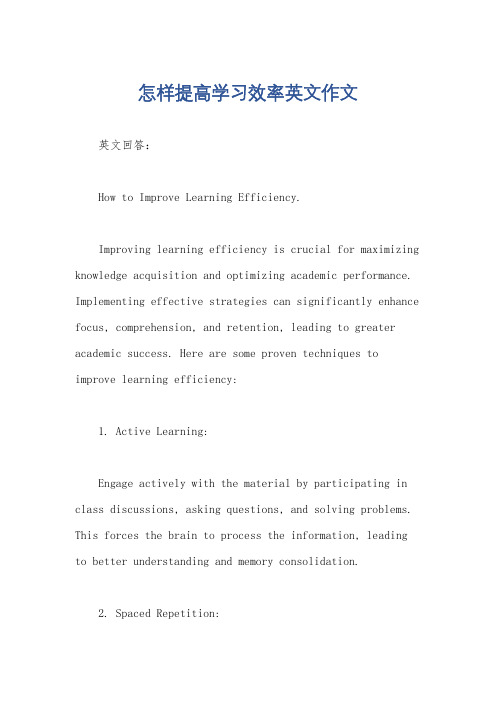
怎样提高学习效率英文作文英文回答:How to Improve Learning Efficiency.Improving learning efficiency is crucial for maximizing knowledge acquisition and optimizing academic performance. Implementing effective strategies can significantly enhance focus, comprehension, and retention, leading to greater academic success. Here are some proven techniques to improve learning efficiency:1. Active Learning:Engage actively with the material by participating in class discussions, asking questions, and solving problems. This forces the brain to process the information, leading to better understanding and memory consolidation.2. Spaced Repetition:Instead of cramming everything at once, distribute study sessions over time. Spaced repetition helps strengthen memories by reinforcing them at increasing intervals, allowing the brain to solidify the information.3. Interleaving Practice:Mix up different subjects or topics during study sessions instead of focusing on one topic for extended periods. This prevents cognitive overload and improves problem-solving abilities.4. Retrieval Practice:Regularly test your understanding by actively recalling information from memory. This forces the brain to retrieve the information, strengthening the neural connections associated with it.5. Elaboration:Connect new information to existing knowledge by explaining concepts in your own words, drawing analogies, or creating mental models. This helps make the information more meaningful and easier to remember.6. Metacognition:Reflect on your learning strategies and identify areas for improvement. Regularly assess your understanding, identify strengths and weaknesses, and adjust your techniques accordingly.7. Prioritize and Plan:Identify the most important concepts and allocate your time accordingly. Create a study schedule and stick to it to ensure regular and focused study sessions.8. Mind Mapping and Visual Aids:Use mind mapping, diagrams, charts, or other visual aids to organize and visualize the material. This helpsimprove comprehension and recall.9. Technology Utilization:Utilize technology to enhance learning, such as educational apps, interactive simulations, or online resources. Incorporate technology into your study sessions to make learning more engaging and effective.10. Collaboration and Discussion:Engage with peers in study groups or discussions. Sharing perspectives, asking questions, and explaining concepts to others can deepen understanding and identify areas for further improvement.By implementing these strategies, you can significantly improve your learning efficiency, enhance your cognitive skills, and maximize your academic potential.中文回答:如何提高学习效率。
如何提高学习效率的演讲稿英语作文
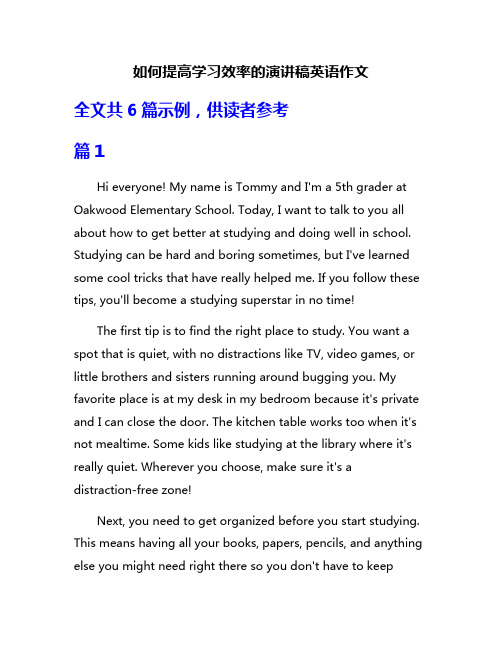
如何提高学习效率的演讲稿英语作文全文共6篇示例,供读者参考篇1Hi everyone! My name is Tommy and I'm a 5th grader at Oakwood Elementary School. Today, I want to talk to you all about how to get better at studying and doing well in school. Studying can be hard and boring sometimes, but I've learned some cool tricks that have really helped me. If you follow these tips, you'll become a studying superstar in no time!The first tip is to find the right place to study. You want a spot that is quiet, with no distractions like TV, video games, or little brothers and sisters running around bugging you. My favorite place is at my desk in my bedroom because it's private and I can close the door. The kitchen table works too when it's not mealtime. Some kids like studying at the library where it's really quiet. Wherever you choose, make sure it's a distraction-free zone!Next, you need to get organized before you start studying. This means having all your books, papers, pencils, and anything else you might need right there so you don't have to keepgetting up to find stuff. I use a cool pencil case that holds all my pencils, erasers, highlighters, and note cards. Having supplies nearby keeps me focused instead of jumping up every five minutes. Being organized is step one for super studying!Now it's time to start studying, but don't worry - there are ways to make it fun! One trick is to listen to calm, instrumental music without words. The kind of music that sounds like video game background music. This helps me concentrate better than studying in total silence. Another idea is to set a timer and take breaks every 20-30 minutes to re-energize. Do some jumping jacks, grab a healthy snack, or just relax your brain for a few minutes before diving back in.When you're actually reading your textbook or notes, use cool strategies like:• Underlining or highlighting important stuff• Making flashcards of key terms and concepts• Drawing pictures and diagrams to help you visualize things• Rewriting your notes in your own words• Quizzing yourself and teac hing the material to a parent or stuffed animalThese techniques work way better than just re-reading the same boring book over and over. Your brain learns best when you interact with the info in different ways.If you're having trouble with a specific topic, don't be afraid to ask your teacher for help. That's what they're there for! You can also ask a friend or parent to quiz you on areas you're struggling with. Sometimes that second perspective is all you need.Another great idea is to form a study group with a few friends from class. You can take turns re-teaching concepts to each other, quiz each other, and work through tough problems together. Studying with friends makes it more fun and you can help each other out.In the end, it all comes down to practice, practice, practice. The more you actively review the material, the better it will stick in your amazing brain! Don't cram everything in at the last minute either - that's a recipe for forgetting stuff fast. Make sure to review a little bit each day instead.Well, those are my best tips for becoming an A+ master student. It takes work, but using cool strategies like finding a perfect study spot, getting organized, making it fun with music and breaks, trying out activities like flashcards and drawings,getting help from others, forming study groups, and practicing regularly will make you into an insanely good studier before you know it. Just keep at it, believe in yourself, and you'll go far!Thanks for listening, study on, and have a great day!篇2How to Be a Super Smart Student: Tips for Learning Better!Hi everyone! My name is Jamie and I'm a 5th grader here at Oakwood Elementary. Today I want to talk to you all about being a super smart student and share some tips that have really helped me learn better.First off, I have to admit that when I was younger, I kind of stunk at school. I would goof off in class, never pay attention, and then wonder why I bombed all my tests! Homework was the worst - I would just slap something together at the last minute. My grades were terrible and my parents were not happy campers.But then in 3rd grade, something clicked. I realized that by learning more and doing better in school, so many more doors would open up for me in life. I decided I wanted to be one of those "smart kids" that everyone admires. So I started workinghard and following some good studying habits, and you know what? It paid off big time! Now I'm getting straight A's and teachers are always complimenting me. Learning is actually fun when you put in the effort.Okay, so let me share my top tips for being a super star student:Tip #1: Pay Attention in ClassThis one is so important! You have to really focus when your teacher is giving a lesson. Put away any games or toys and just concentrate. If you zone out, you'll miss key information and then you'll be totally lost later. Ask questions if you don't understand something. Teachers are there to help!Tip #2: Take Great NotesAlong with paying attention, you need to take awesome notes to reinforce what you're learning. Use colorful pens and highlighters, abbreviate words, and come up with creative memory tricks. Having clear, well-organized notes makes studying so much easier.Tip #3: Participate and Ask QuestionsDon't just sit there like a bump on a log! Raise your hand and participate in class discussions and activities. The more engagedyou are, the more you'll understand and remember. And never be afraid to ask your teacher questions - that's how you learn!Tip #4: Do Your HomeworkI know, homework is a drag. But it's crucial for solidifying the concepts you learned in class that day. My advice? Don't procrastinate - do it right after school when it's fresh. And find a nice quiet spot without any distractions so you can concentrate.Tip #5: Study SmartWhen it's time to study for tests and quizzes, don't just reread your notes over and over. That's boring and ineffective. Instead, make flashcards, draw diagrams and charts, create rhymes and songs - anything to make the info stick! Teach the concepts to your parents too. Explaining it out loud really reinforces your knowledge.Tip #6: Manage Your Time WiselyBetween school, activities, chores and hanging out with friends, it's easy to feel overwhelmed. Make a schedule and block out regular homework/study times so you stay on track. A little planning goes a long way! And be sure to get plenty of sleep so you're fresh and alert at school.Tip #7: Stay MotivatedSome days you may feel discouraged or frustrated with a subject. That's normal! The key is to keep motivated and have a positive mindset. Remind yourself that your effort will pay off. Set little goals and reward yourself when you achieve them. Most importantly, don't be afraid to ask for help!Those are my top tips for being an academic superstar! I really hope they've inspired you to kick your learning into high gear. Just remember that with the right strategies and an awesome attitude, you can totally rock at school. Learning is power!I'll leave you with one of my favorite quotes from Albert Einstein: "It's not that I'm so smart, it's just that I stay with problems longer." So keep persisting, never give up, and you will succeed!Thanks for listening, study hard, and have a great year!篇3Hey friends! Today I want to talk to you about something really important - how to study better and get more out of the time you spend on homework and preparing for tests. We all want to do well in school, but studying can be boring and it's easy to get distracted. I used to struggle a lot with stayingfocused until I learned some cool tricks. If you follow my advice, you'll be a studying superstar in no time!The first big tip is to find the right environment for studying. Your brain works best when you eliminate distractions. That means no TV, no video games, no scrolling through social media - none of that fun stuff when it's time to hit the books. Make yourself a special study zone that is quiet and has minimal distractions. It could be a desk in your bedroom, a spot at the kitchen table, or even a cozy corner of the living room. But no matter where you choose, keep it clean and free of clutter so you can concentrate. Having all your school supplies within reach is helpful too.Next up, did you know that taking breaks is actually good for learning? It's true! Studying for hours on end without a break is a surefire way to get burnt out. Instead, work in short bursts then reward yourself with a 5-10 minute break. During your break time, get up and move around, have a healthy snack, or do some stretches. Getting your blood pumping will re-energize your body and mind. Just be sure to set a timer so you don't lose track of time and turn your break into the main event!Another amazing study hack is something called "active learning." This means really getting involved with the materialinstead of just reading or re-reading the same information over and over. You could try techniques like:• Explaining concepts out loud like you're teaching them to a friend• Rewriting notes using your own words and examples• Creating flashcards, diagrams, or mini quiz questions for yourself• Solving practice problems without referring to examplesThe more actively you engage with the content, the stronger those neural connections become in your amazing brain. It's like exercising a muscle - the harder you work it, the stronger it gets!Speaking of exercise, taking care of your body is so important for peak brain performance. Make sure you're eating a balanced diet with plenty of fruits, veggies, whole grains, and lean protein to fuel your body and mind. Stay hydrated by drinking lots of water too. Getting enough sleep is also hugely important. Experts recommend 9-12 hours per night for kids our age. I know that sounds like a lot, but high-quality sleep helps you lock in what you've learned. You'll be a zombie if you're running on fumes!Lastly, let's talk about managing your time wisely. At the start of each week, look at your schedule and plan out när you'll tackle different assignments, study for upcoming tests, and work on long-term projects. Writing it all down in your planner andmaker a schedule is key. Crossing things off your list as you go feels awesome! And remember to prioritize - there's no prize for burning the midnight oil on that ancient history poster if you have a huge math test the next morning.Those are my top tips for studying smarter, not longer. They've made a huge difference for me, and I know they can work for you too. Just imagine how accomplished you'll feel when you start acing tests, turning in awesome assignments, and really understanding what you're learning. School is a lot more fun and rewarding when you're on your A-game. So what are you waiting for? Apply these strategies starting today and get ready to become an academic superstar! Let's do this, brainiacs!篇4Hi everyone! My name is Jamie and I'm a 5th grader here at Oakwood Elementary School. Today I want to talk to you all about something really important - how we can all become better students and improve our study efficiency.First off, what does "study efficiency" even mean? Well, it means doing the best job you can when studying or working on assignments so that you learn things faster and easier. It's about getting more out of the time you spend hitting the books.I've learned some great tips over the years that have really helped me, and I want to share them with you. That way, we can all get smarter and get better grades without having to spend every waking hour studying. Sound good? Okay, let's get started!Tip #1: Find the Right Study SpaceOne of the most important things for studying well is having a good place to do it. You need a spot that is quiet, free of distractions, and has everything you need close by. Maybe it's a desk in your bedroom or a spot at the kitchen table. Wherever it is, keep it neat and organized.Speaking of being organized, that's my next tip!Tip #2: Get OrganizedIf your notebooks, folders, pencils, and other supplies are a mess, it's really hard to focus. Take some time to get organized - clean out your backpack, arrange your folders by subject, get plenty of pencils and erasers, and keep everything in one place. You'll save so much time not searching for things you need.Tip #3: Take BreaksThis one might sound silly, but taking breaks is actually super important when studying. Sitting still for hours on end is brutal. Instead, work for 30-45 minutes, then take a 10 minute break to recharge. Get up, walk around, drink some water or a healthy snack. You'll come back to your work feeling refreshed.Tip #4: Find What Works For YouWe all learn differently. Some people remember things better by writing them out. Others are good auditory learners who do well by reading out loud. I'm a visual learner, so using diagrams, charts, and color coding helps me a ton. Think about what learning methods work best for you and use lots of those strategies.Tip #5: Ask QuestionsDon't be afraid to ask your teacher for help if you don't understand something! That's what they're there for. Write down anything confusing as it comes up so you can get it clarified. Asking questions is a great way to learn.Tip #6: Put Away DistractionsThese days we have so many things that can distract us - phones, video games, TV, you name it. When it's study time, putthose distractions away completely. Even if you think you can multi-task, you'll learn way better by focusing solely on your work. That phone can wait!Tip #7: Get Plenty of SleepWhat's the point of studying hard if you're a exhausted zombie the next day? Getting 8-10 hours of sleep is crucial for a kid your age. When you're well-rested, you'll have more energy, concentrate better, and remember more of what you studied. Sleep is super important for doing your best!Tip #8: Schedule Study TimeRather than just trying to cram everything in at the last minute, schedule study sessions for each subject well in advance. Create a weekly calendar and set aside blocks of time specifically for things like math homework, prepping for a test, or working on a project. Stick to that schedule!Tip #9: Take Good NotesYou can't properly review the things you're learning if you don't have good notes to look back on. Practice active listening and effective note-taking skills during class lectures and lessons. Use abbreviations, bullet points, and diagrams to capture the key info in an organized way.Tip #10: Find a Study GroupTwo heads are better than one! For my last tip, I recommend finding some friends to create a study group. You can quiz each other, discuss tough concepts, and keep each other motivated. Working with others is a great way to solidify what you're learning.Those are my top 10 tips for all of you! I hope you'll give them a try. Getting good grades doesn't have to be boring or frustrating if you have the right strategies. Just remember to stay focused, get organized, and establish good habits. You've got this!Thank you all for listening. Study hard, dream big, and have a great rest of the school year! Let's get those A's!篇5Hi everyone! My name is Jamie and I'm going to talk to you today about how to be a better student and improve your study efficiency. This is really important because if you can study better, you'll learn more and get higher grades. That will make your parents and teachers proud of you!The first tip is to find a good study spot. You want a place that is quiet with few distractions. Maybe it's a little corner of your bedroom or a spot at the kitchen table when nobody else is around. Having a special "study zone" will help train your brain that when you're in that spot, it's time to focus. Avoid places with lots of noise like the TV room or areas where littlebrothers/sisters might bother you.Next, get rid of distractions before you start studying. Put your video games, phone, and other fun toys away in another room. Having them right there is just too tempting. You'll waste a bunch of time and not get your work done. Having some quiet background music without words can sometimes help you concentrate, but loud music with singing is just another distraction.Now you need to prepare your study zone properly. Make sure you have all the supplies you'll need like pencils, paper, textbooks, notebooks, etc. Having to stop and look for things wastes time. Get a drink of water too so you don't get thirsty and have to take a break. Go to the bathroom before starting too. The fewer reasons you have to get up, the better!Okay, now you're ready to start studying! But you can't just stare at your books - you need a plan. Look at what assignmentsyou need to complete and roughly how long each one will take. Make a schedule so you know what to work on first. Don't accidentally spend too much time on one subject and run out of time for the others.As you study, take little breaks every 30 minutes or so. Just 5 minutes to stretch, get a snack, or let your mind rest. Studying for hours without a break is a big mistake. Your brain will get tired and you'll have trouble focusing. The short breaks willre-energize you.Another tip is to switch between different types of studying. Don't just read your textbook for 2 hours straight. That's so boring! Instead, you could read for 30 minutes, then do some practice problems, then re-write your notes, then read again, and so on. Mixing it up will keep you more engaged.You should also try to connect what you're learning to things you already know or are interested in. Like if you're studying about animals, think about how it relates to your pets at home or things you've seen on TV about animals. Making connections helps the information stick in your brain better.As you're studying, a really good habit is to rephrase the information in your own words then say it out loud. Reading it over and over is okay, but rephrasing it yourself is even better.Hearing yourself explain it will reinforce the concepts. If you have a study buddy, you could take turns explaining things to each other too.Speaking of study buddies, studying with a friend can be great! You can quiz each other, explain tough concepts, and motivate each other to keep going. Just make sure you actually study together and don't get too distracted with non-stop chatting and gossiping.Another important thing is taking good notes. Don't just blindly copy everything written on the board or in the textbook. Figure out the key points and write those in your own words. Use shorthand, abbreviations, and diagrams when you can. Having clear, concise notes will really help you review and remember better.Next tip: always review your notes regularly. Like maybe 10 minutes before the end of each class period and again each evening. It's way better than waiting until right before a test to quickly cram. Spacing out your studying over time will make the information stick way better in your long-term memory.My last main tip is about using vivid imagery and making associations to remember facts. Like for history dates, you could picture a imaginary funny scene that represents the date'snumbers. Or associate parts of your body with lists of items you need to memorize. Getting creative will make things more memorable instead of just staring at boring words and numbers.Well, those are my best tips for improving your study efficiency! It takes practice to build good habits. But following this advice will help you learn faster, get better grades, and hopefully find studying a little more fun and interesting too. Let's all be awesome students together! Thanks for listening!篇6Hi everyone! My name is Jamie and I'm here today to talk about something super important - how to be a better learner! We all go to school to learn new things, but sometimes it feels like no matter how hard we try, the information just doesn't stick in our brains. Well, I've got some awesome tips that can help make learning easier and more fun!First up, let's talk about paying attention. I know, I know, it can be really hard to focus when the teacher is going on and on about stuff that seems boring. But paying attention is sooo important for learning. When your mind starts to wander, try squeezing a stress ball or fidgeting with a piece of putty. Getting that extra energy out can help you concentrate better. You canalso drink plenty of water and avoid sugary snacks that'll make you crash later.Another hugely helpful thing is taking good notes. Notes help cement what you're learning into your memory. Use colorful pens and highlighters, and abbreviate words to write faster. You can also draw little doodles related to the topic in the margins - getting creative cements concepts better than just words! After class, re-write your notes to reinforce things.Speaking of reinforcing, quizzing yourself is an A-plus way to improve learning. Make flashcards of key terms and concepts, then ask a parent or friend to quiz you. Seeing how much you know (and don't know!) shows what you need to spend more time studying. Self-quizzing with flashcards or practice tests is great too.Lots of students learn best by teaching others. Grab a stuffed animal and pretend you're the teacher, explaining the concepts out loud. Orform a study group with friends and take turns teaching each other different topics. The process of putting lessons into your own words and examples really solidifies the knowledge.To keep yourself motivated, set little rewards for achieving learning goals. Like if you master your times tables, you get toplay a fun math game. Or if you read a chapter book, you get a small prize. It's also really important to get enough sleep, nutrition, and activity - our brains need healthy bodies to function their best!Hands-on activities make lessons way more engaging. If you're learning about ancient Egypt, make a miniature pyramid or sarcophagus out of craft supplies. Studying clouds? Use cotton balls to form different types. Acting things out, making models, doing experiments - that kinesthetic learning is amazing for getting concepts to stick.Finally, don't be afraid to ask questions! There's no such thing as a dumb question. Raise your hand in class when you're confused, or ask for help from a parent or older student. Figuring out where the gaps in your knowledge are lets you focus on solidifying those shaky areas.So to recap, here are my top tips for being an awesome, efficient learner:Stay focused by fidgeting, drinking water, and avoiding sugar crashesTake great notes with colors, doodles and abbreviationsMake flashcards and quizzes to reinforce your knowledgeTeach concepts to others by explaining things out loudMotivate yourself with little rewards for goalsStay healthy with good sleep, nutrition and activityDo lots of hands-on projects and activitiesNever hesitate to ask questions!Learning is hard work, but it's also an amazing opportunity to grow our brains and discover new things about ourselves and the world around us. If we make learning more engaging and fun, it'll be a lot easier to be successful students. So don't get discouraged - just use these tips and you'll be an expert learner in no time! Thanks for listening, study buddies!。
英语作文-提高学习效率的方法
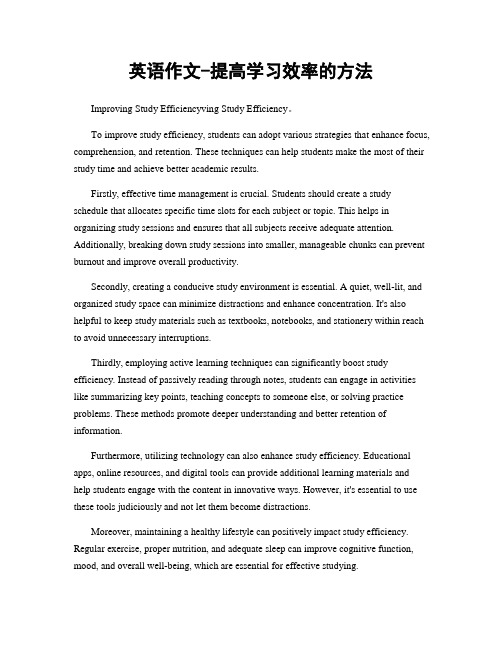
英语作文-提高学习效率的方法Improving Study Efficiencyving Study Efficiency。
To improve study efficiency, students can adopt various strategies that enhance focus, comprehension, and retention. These techniques can help students make the most of their study time and achieve better academic results.Firstly, effective time management is crucial. Students should create a study schedule that allocates specific time slots for each subject or topic. This helps in organizing study sessions and ensures that all subjects receive adequate attention. Additionally, breaking down study sessions into smaller, manageable chunks can prevent burnout and improve overall productivity.Secondly, creating a conducive study environment is essential. A quiet, well-lit, and organized study space can minimize distractions and enhance concentration. It's also helpful to keep study materials such as textbooks, notebooks, and stationery within reach to avoid unnecessary interruptions.Thirdly, employing active learning techniques can significantly boost study efficiency. Instead of passively reading through notes, students can engage in activities like summarizing key points, teaching concepts to someone else, or solving practice problems. These methods promote deeper understanding and better retention of information.Furthermore, utilizing technology can also enhance study efficiency. Educational apps, online resources, and digital tools can provide additional learning materials and help students engage with the content in innovative ways. However, it's essential to use these tools judiciously and not let them become distractions.Moreover, maintaining a healthy lifestyle can positively impact study efficiency. Regular exercise, proper nutrition, and adequate sleep can improve cognitive function, mood, and overall well-being, which are essential for effective studying.In conclusion, improving study efficiency requires a combination of effective time management, a conducive study environment, active learning techniques, the use of technology, and a healthy lifestyle. By incorporating these strategies into their study routine, students can enhance their learning experience and achieve academic success.。
怎样提高学习效率英语作文演讲稿
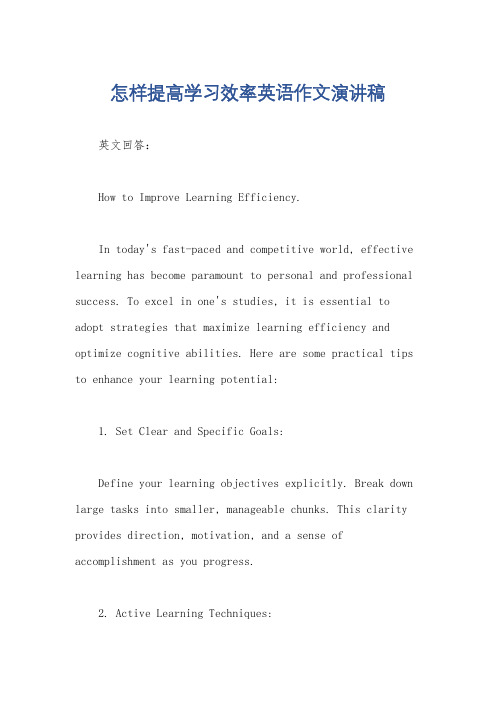
怎样提高学习效率英语作文演讲稿英文回答:How to Improve Learning Efficiency.In today's fast-paced and competitive world, effective learning has become paramount to personal and professional success. To excel in one's studies, it is essential to adopt strategies that maximize learning efficiency and optimize cognitive abilities. Here are some practical tips to enhance your learning potential:1. Set Clear and Specific Goals:Define your learning objectives explicitly. Break down large tasks into smaller, manageable chunks. This clarity provides direction, motivation, and a sense of accomplishment as you progress.2. Active Learning Techniques:Engage actively with the material you are studying. Participate in discussions, ask questions, summarize key points, and explain concepts to others. These active learning strategies promote deeper comprehension and long-term retention.3. Spaced Repetition:Review the material at increasing intervals instead of cramming everything before an exam. This spaced repetition technique strengthens memory traces and improves recall, making the knowledge more readily available.4. Interleaving:Mix up different subjects or topics during your study sessions instead of focusing on one subject for an extended period. Interleaving helps improve conceptual understanding and promotes cognitive flexibility.5. Retrieval Practice:Regularly test your understanding by retrieving information from memory. Use flashcards, practice questions, or self-quizzes to actively recall the material you have learned. This process enhances memory consolidation and strengthens neural pathways.6. Elaboration and Connection:Connect new knowledge to what you already know. Elaborate on concepts by creating mental models, analogies, or examples. These connections help integrate information into your existing knowledge structures and improve comprehension.7. Chunking:Organize the material you are learning into smaller, manageable chunks. This helps reduce cognitive load and promotes better understanding. You can use headings, bullet points, or diagrams to create visually appealing chunks.8. Feedback and Reflection:Seek feedback from teachers, peers, or mentors toidentify areas for improvement. Reflect on your learning strategies and make adjustments as needed. This ongoing evaluation and refinement process enhances learning efficiency.9. Technology Integration:Utilize educational technology to support your learning. Explore online platforms, apps, and educational softwarethat provide interactive exercises, videos, andpersonalized feedback. These tools can supplementtraditional learning and enhance engagement.10. Learning Environment:Create a conducive learning environment that minimizes distractions and promotes focus. Choose a study space with adequate lighting, ventilation, and comfort. Removepotential interruptions like noise or clutter to optimizeyour learning sessions.中文回答:如何提高学习效率。
提高学习效率的英语作文3篇
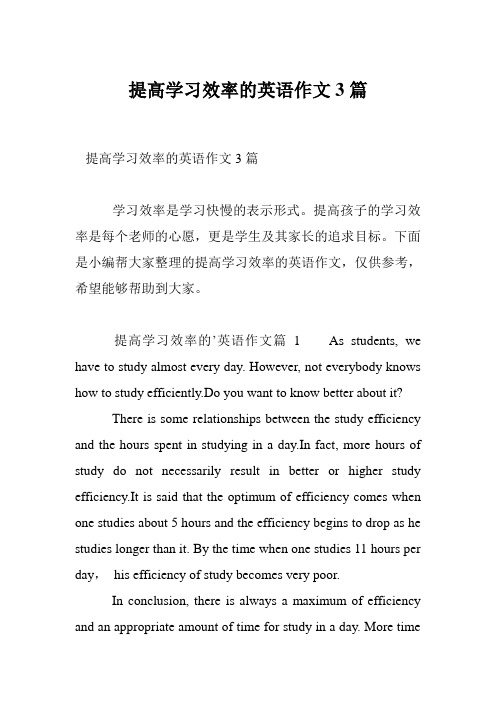
提高学习效率的英语作文3篇提高学习效率的英语作文3篇学习效率是学习快慢的表示形式。
提高孩子的学习效率是每个老师的心愿,更是学生及其家长的追求目标。
下面是小编帮大家整理的提高学习效率的英语作文,仅供参考,希望能够帮助到大家。
提高学习效率的’英语作文篇1As students, we have to study almost every day. However, not everybody knows how to study efficiently.Do you want to know better about it?There is some relationships between the study efficiency and the hours spent in studying in a day.In fact, more hours of study do not necessarily result in better or higher study efficiency.It is said that the optimum of efficiency comes when one studies about 5 hours and the efficiency begins to drop as he studies longer than it. By the time when one studies 11 hours per day,his efficiency of study becomes very poor.In conclusion, there is always a maximum of efficiency and an appropriate amount of time for study in a day. More timespent in study doesn’t always mean greater efficiency.提高学习效率的英语作文篇2Li Ming studies in a high school, and this is his second year. In order to get improved as soon as possible, he decided to study late every night. Usually, he would go to sleep about 11 o'clock, but the pressure made him couldn't sleep well, so he kept study until 12 o'clock. A month passed, Li Ming realized that he didn't make progress, instead, he lag behind. He talked to his teacher and the teacher told him that he needed to rest well and took it easy.Only the student slept well would he have the energy to study and focus on his attention. Li Ming did as the teacher said, indeed. It worked, he made progress and he could thought quickly. Sleeping well is the very important way to improve study efficiency.李明是一名高中生,今年他高二了。
如何提高学习效率英语作文演讲稿
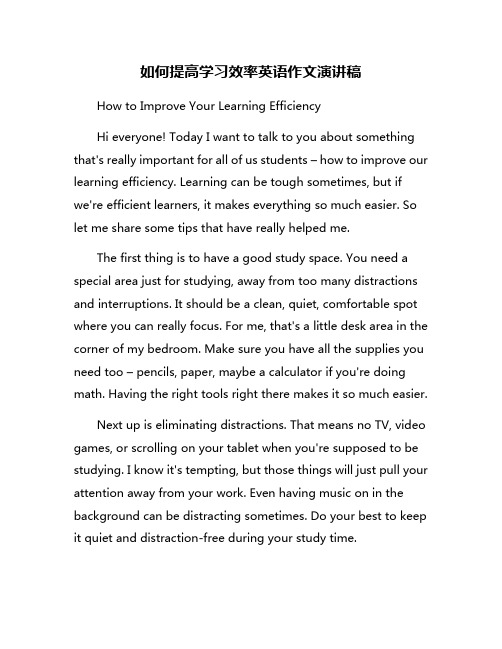
如何提高学习效率英语作文演讲稿How to Improve Your Learning EfficiencyHi everyone! Today I want to talk to you about something that's really important for all of us students – how to improve our learning efficiency. Learning can be tough sometimes, but ifwe're efficient learners, it makes everything so much easier. So let me share some tips that have really helped me.The first thing is to have a good study space. You need a special area just for studying, away from too many distractions and interruptions. It should be a clean, quiet, comfortable spot where you can really focus. For me, that's a little desk area in the corner of my bedroom. Make sure you have all the supplies you need too – pencils, paper, maybe a calculator if you're doing math. Having the right tools right there makes it so much easier.Next up is eliminating distractions. That means no TV, video games, or scrolling on your tablet when you're supposed to be studying. I know it's tempting, but those things will just pull your attention away from your work. Even having music on in the background can be distracting sometimes. Do your best to keep it quiet and distraction-free during your study time.Another awesome tip is to take breaks! It's really hard to concentrate for hours on end. After maybe 30-45 minutes of focused work, take a 5-10 minute break. Get up, walk around, have a healthy snack or some water. That short break lets your brain rest for a minute before diving back in. Just be sure to stick to a time limit on your breaks!Studying for shorter periods but more frequently is way better than cramming everything into a couple marathon sessions. Our brains can only soak up so much new information at a time before we hit overload. Breaking things up into smaller chunks makes it so much easier to learn and remember stuff.Speaking of remembering, using memory tricks is super helpful too. Things like mnemonics, flashcards, diagrams and visuals – they all make it easier for our brains to encode and lock in that knowledge. I love making flashcard games out of vocabulary words and math facts. Mixing in some fun with the learning really works for me.It's also important to take good notes. Pay attention to what your teacher says are the key points and write those down. You can use different colors, symbols or diagrams to organize your notes in a way that makes sense for how your brain works.Reading over your notes later reinforces everything you learned in class.Active learning is way better than just sitting and listening too. Don't be afraid to ask questions in class when you're confused about something. Discussing and explaining concepts to others is an awesome way to solidify your understanding as well. Joining a study group is one of the best ways to learn actively.Getting enough sleep is huge for being a good learner too. I know it's tempting to stay up late playing games or watching videos, but not getting enough rest makes it brutally hard to focus and soak up information the next day. Stick to a good sleep schedule as much as you can. Your brain will thank you!Diet plays a role too. You've got to fuel that brain with healthy foods like fruits, veggies, whole grains and lean protein. Stay hydrated by drinking lots of water too. It's amazing how much better you can concentrate when your body and brain are getting the right nutrition.Those are some of the best tips I've learned for efficient studying and learning. Just to recap quickly:Have a dedicated, distraction-free study spaceEliminate TV, games, music and other things that could distract youTake brief breaks every 30-45 minutesStudy in shorter, more frequent sessionsUse memory tricks like flashcards and visualsTake good notes in classBe an active learner and don't be afraid to ask questionsGet plenty of sleepEat a healthy diet and stay hydratedFollowing those tips has made such a difference for how much I can absorb and remember. Learning is still hard work, but being an efficient learner makes that work so much easier. I hope these strategies will help you guys too! Let me know if you have any other great tips to share as well. The more tools we have for efficient learning, the better!。
怎样提高学习效率演讲稿英语作文
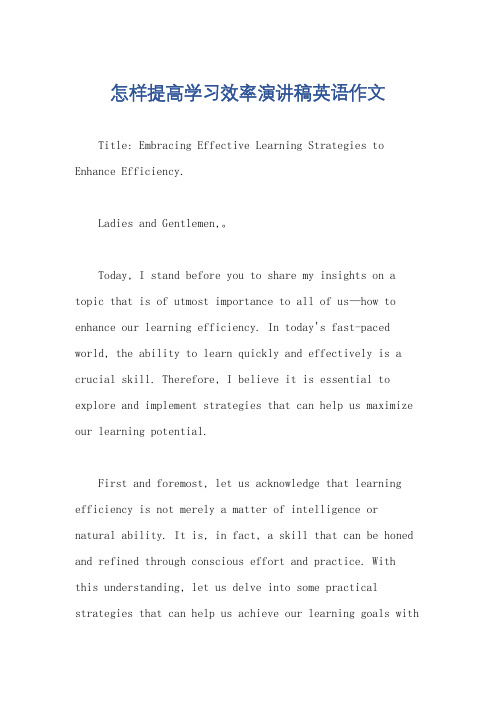
怎样提高学习效率演讲稿英语作文Title: Embracing Effective Learning Strategies to Enhance Efficiency.Ladies and Gentlemen,。
Today, I stand before you to share my insights on a topic that is of utmost importance to all of us—how to enhance our learning efficiency. In today's fast-paced world, the ability to learn quickly and effectively is a crucial skill. Therefore, I believe it is essential to explore and implement strategies that can help us maximize our learning potential.First and foremost, let us acknowledge that learning efficiency is not merely a matter of intelligence or natural ability. It is, in fact, a skill that can be honed and refined through conscious effort and practice. Withthis understanding, let us delve into some practical strategies that can help us achieve our learning goals withgreater efficiency.One of the most crucial strategies for improving learning efficiency is to set clear and specific goals. Goals provide us with a sense of direction and help us focus our energies on what is truly important. When setting goals, it is essential to ensure that they are SMART—Specific, Measurable, Ach.。
高中英语作文如何提高学生的学习效率

高中英语作文如何提高学生的学习效率Title: Strategies for Enhancing Student Learning EfficiencyIntroduction:Efficient learning is crucial for students to achieve their academic goals.It not only saves time but also enhances understanding and retention.In this essay, we will explore several effective methods to improve student learning efficiency.Body:1.Set Clear Goals:Students should set specific and achievable goals.This provides them with a sense of direction and purpose.By having a clear understanding of what they want to achieve, students can focus their efforts and resources accordingly.2.Create a Study Schedule:Creating a study schedule helps students manage their time effectively.They should allocate specific time slots for different subjects and tasks.This ensures that no subject is neglected and helps maintain a balanced approach to learning.3.Develop Good Learning Habits:Establishing good learning habits is vital for efficiency.This includes reading assignments carefully, taking thorough notes, and actively engaging in class discussions.Additionally, students should avoidprocrastination and stay organized, which helps prevent last-minute rush and stress.4.Utilize Active Learning Techniques:Active learning involves actively engaging with the material rather than passively reading or listening.Techniques such as group discussions, flashcards, mind mapping, and practice quizzes can enhance understanding and retention.These methods encourage students to think critically and make connections between different concepts.5.Seek Help When Needed:Students should not hesitate to seek help when they encounter difficulties.This could be from teachers, classmates, or even online resources.By addressing questions and misconceptions promptly, students can avoid falling behind and maintain their learning momentum.6.Regular Review and Self-Assessment:Regularly reviewing course materials and self-assessing progress can help reinforce learning.Students should set aside time to revisit previously learned concepts and evaluate their understanding.This enables them to identify areas that need improvement and make necessary adjustments to their study strategies.7.Stay Focused and Avoid Distractions:Creating a conducive learning environment is essential for maintaining focus.Students should find a quiet and well-lit space,minimize distractions like smartphones, and avoid multitasking.By staying focused, students can optimize their learning efficiency and make the most of their study time.Conclusion:Improving student learning efficiency is a multi-faceted process that requires consistent effort and discipline.By setting clear goals, creating a study schedule, developing good habits, utilizing active learning techniques, seeking help when needed, and staying focused, students can enhance their learning efficiency.With these strategies in place, students can make the most of their study time and achieve their academic goals effectively.。
如何提高学习效率英语作文演讲稿
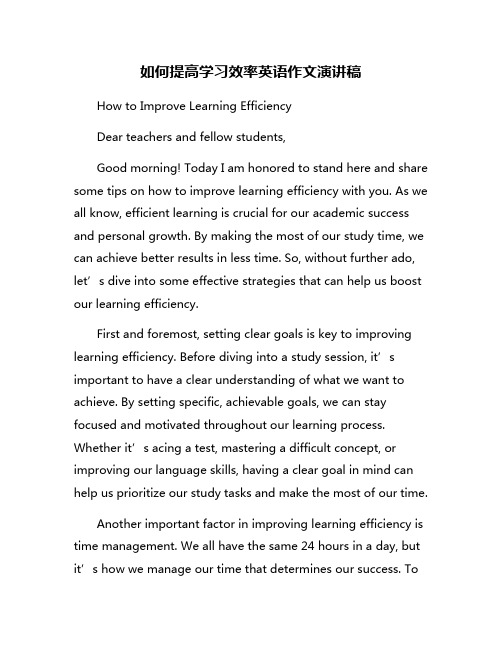
如何提高学习效率英语作文演讲稿How to Improve Learning EfficiencyDear teachers and fellow students,Good morning! Today I am honored to stand here and share some tips on how to improve learning efficiency with you. As we all know, efficient learning is crucial for our academic success and personal growth. By making the most of our study time, we can achieve better results in less time. So, without further ado, let’s dive into some effective strategies that can help us boost our learning efficiency.First and foremost, setting clear goals is key to improving learning efficiency. Before diving into a study session, it’s important to have a clear understanding of what we want to achieve. By setting specific, achievable goals, we can stay focused and motivated throughout our learning process. Whether it’s acing a test, mastering a difficult concept, or improving our language skills, having a clear goal in mind can help us prioritize our study tasks and make the most of our time.Another important factor in improving learning efficiency is time management. We all have the same 24 hours in a day, but it’s how we manage our time that determines our success. Tomake the most of our study time, it’s crucial to create a schedule and stick to it. Setting aside dedicated study periods, eliminating distractions, and taking breaks when needed can help us stay focused and productive. By managing our time effectively, we can maximize our learning potential and achieve better results in less time.Furthermore, utilizing effective study techniques can significantly improve our learning efficiency. One such technique is active learning, which involves engaging with the material through various methods such as summarizing, questioning, and applying the concepts to real-world scenarios. By actively participating in our learning process, we can deepen our understanding of the material and retain information more effectively.In addition to active learning, using tools and resources to aid in our studies can also help improve learning efficiency. Whether it’s using flashcards, online tutorials, or study groups, leveraging additional resources can enhance our learning experience and help us grasp difficult concepts more easily. By exploring different study tools and techniques, we can find what works best for us and tailor our study approach to suit our individual learning style.Lastly, self-care plays a crucial role in improving learning efficiency. It’s important to take care of our physical and mental well-being in order to perform at our best academically. Getting enough sleep, eating a balanced diet, and exercising regularly can all contribute to our overall health and well-being, which in turn can improve our cognitive function and learning abilities. By taking care of ourselves, we can approach our studies with a clear mind and a positive attitude, setting ourselves up for success in the classroom and beyond.In conclusion, by setting clear goals, managing our time effectively, using active learning techniques, leveraging study resources, and prioritizing self-care, we can improve our learning efficienc y and achieve greater academic success. Let’s all strive to implement these strategies in our daily study routine and unlock our full learning potential. Thank you for listening, and best of luck on your academic journey!。
- 1、下载文档前请自行甄别文档内容的完整性,平台不提供额外的编辑、内容补充、找答案等附加服务。
- 2、"仅部分预览"的文档,不可在线预览部分如存在完整性等问题,可反馈申请退款(可完整预览的文档不适用该条件!)。
- 3、如文档侵犯您的权益,请联系客服反馈,我们会尽快为您处理(人工客服工作时间:9:00-18:30)。
高中英语作文:如何提高学习效率
【篇一】如何提升学习效率 How to Study Efficiently
Li Ming studies in a high school, and this is his second year. In order to get improved as soon as possible, he
decided to study late every night. Usually, he would go to sleep about 11 o’clock, but the pressure made him couldn’t sleep well, so he kept st udy until 12 o’clock. A month passed, Li Ming realized that he didn’t make progress, instead, he lag behind. He talked to his teacher and the teacher told him that he needed to rest well and took it easy. Only the student slept well would he have the energy to study and focus on his attention. Li Ming did as the teacher said, indeed. It worked, he made progress and he could thought quickly. Sleeping well is the very important way to improve study efficiency.
李明是一名高中生,今年他高二了。
为了尽快得到提升,他决定每晚
都学到很晚。
通常情况下,他11点钟就去睡觉了,但是,压力使他睡
不着,所以他一直学习到12点钟。
一个月过去了,李明意识到他没有
取得进步,相反,他落后了。
他跟他的老师交流了下,老师告诉他,
他需要休息好,放松点。
只有休息得好,才会有精力去学习,集中注
意力。
李明照老师说的去做了,事实上,确实奏效了,他取得了进步,思维转得也快。
睡眠好是提升学习效率非常重要的方法。
【篇二】女性的力量The Woman’s Power
Barack Obama is the first president of black people, whose story inspires so many young people to chase their dreams. As the saying that every successful man has a woman to support him, and this woman for Obama is his wife Michelle. As the
first lady, Michelle helped Obama so much. During the
campaign, she gave inspiring speeches and people knew what they should voted for. Michelle was born in a poor family, but her mother paid special attention to education. Michelle was the top students all the time and she entered the top university, then she got the degree of doctor. Then she worked in a good law office. She was an excellent lawyer and the job experience made her a good orator. Michelle set good examples for the women. She showed that woman’s power was great, and they could be whoever they wanted.
奥巴马是第一个黑人总统,他的事迹激励了很多年轻人去追逐他们的梦想。
俗话说每个成功的男人背后都有一个支持他的女人,对奥巴马来说这个女人就是他的妻子米歇尔。
作为第一夫人,米歇尔对奥巴马的协助很大。
在竞选期间,她发表了鼓舞人心的演讲,让人们知道他们应该投票支持谁。
米歇尔出生在一个贫穷的家庭,但她的母亲特别注重教育。
米歇尔一直都是秀的学生,她进入顶尖大学,获得了博士学位。
然后她在一家优秀的律师事务所工作。
她是一个优秀的律师,她的律师工作经验使她成为一名优秀的演说家。
米歇尔为女性树立了好榜样,她告诉了大家女性的力量是伟大的,她们能够成为任何她们想成为的人。
【篇三】偷礼物的妈妈 A Mother Who Stole the Gift
For every kid, Children’s Day is a big day , because they can enjoy the festival and get presents from schools and parents. While on this happy day, a mother was caught stealing chicken leg in the supermarket. The media paid much attention to it, because the mother was trying to bring the chicken leg as a gift to her daughter. The poor mother was forgiven by the public, as they had sympathy for her. As the media reported this news, many people wanted to donate money to this mother, helping her to buy gifts to her daughter.。
